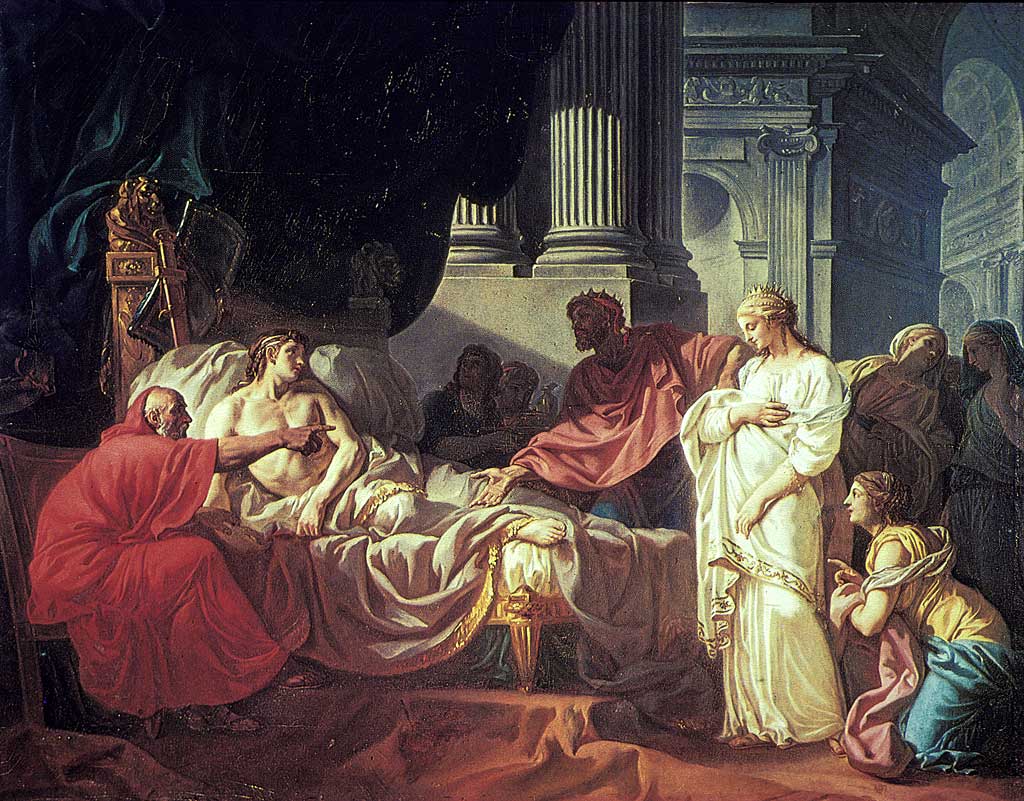Valerius Maximus, 5.7 ext. 1
“Let’s turn to somethings more pleasant to think about. Antiochus, the son of king Seleucus, was overcome with endless love for his stepmother Stratonice. Because he knew he was burning with taboo passions, he was hiding the wound of his wicked heart with dutiful dissimulation.
These warring emotions which were shut up in the same organs—the most pressing desire and the deepest shame—tortured him, causing his body to waste away. He used to stretch out in bed like a dying man and his close friends were lamenting. His father, laid out by grief, was thinking of the death of his only son and his own terrible loss. The whole house was funereal instead of royal.
But the wisdom of Leptines the Astrologer or Erisastratos the physician as some claim dispelled the cloud of sorrow. While sitting next to Antiochus, he noticed that the boy’s complexion grew ruddy and his breath hastened when Stratonice entered. And he got to the truth itself with a more investigative observation. While Stratonice was entering and the exciting again, he quietly grasped the young man’s arm and figured out what kind of sickness this was by the increase or decrease of his pulse.
He told Seleucus right away and Seleucus wasted no time in giving his wife who was most dear to him over to his son. For he believed that Fate caused his son to fall in love but that honor had prepared him to hide that love to death itself. Think for yourself of that old king, a lover. For it will soon be clear how many difficult troubles came when a father’s indulgence reigned supreme.”
Ceterum ut ad iucundiora cognitu veniamus, Seleuci regis filius Antiochus, novercae Stratonices infinito amore correptus, memor quam improbis facibus arderet, impium pectoris vulnus pia dissimulatione contegebat. itaque diversi adfectus iisdem visceribus ac medullis inclusi, summa cupiditas et maxima verecundia, ad ultimam tabem corpus eius redegerunt. iacebat ipse in lectulo moribundo similis, lamentabantur necessarii, pater maerore prostratus de obitu unici filii deque sua miserrima orbitate cogitabat, totius domus funebris magis quam regius erat vultus.
sed hanc tristitiae nubem Leptinis mathematici vel, ut quidam tradunt, Erasistrati medici providentia discussit: iuxta enim Antiochum sedens, ut eum ad introitum Stratonices rubore perfundi et spiritu increbrescere, eaque egrediente pallescere et excitatiorem anhelitum subinde recuperare animadvertit, curiosiore observatione ad ipsam veritatem penetravit: intrante enim Stratonice et rursus abeunte bracchium adulescentis dissimulanter apprehendendo modo vegetiore, modo languidiore pulsu venarum comperit cuius morbi aeger esset, protinusque id Seleuco exposuit. qui carissima sibi coniuge filio cedere non dubitavit, quod in amorem incidisset Fortunae acceptum referens, quod dissimulare eum ad mortem usque paratus esset ipsius pudori imputans. subiciatur animis senex rex amans: iam patebit quam multa quamque difficilia paterni adfectus indulgentia superavit.
Stratonice, a Macedonian noble and granddaughter of Antipater (who held Macedonia as regent when Alexander went on his campaign in 331 BCE) was married to Seleucus in 300 BCE at age 17 and then his son Antiochus in 294 BCE. Her daughter with Seleucus (Phila) went on to marry Antigonus II Gonatas, who ruled Macedonia. One son with Antiochus, a second Seleucus, was executed. But her other son, Antiochus II Theos, ruled the Seleucid empire after the first Antiochus. Another daughter, Apama II, married Magas of Cyrene and was mother of Berenice II.
There should be a miniseries about Stratonice.


After watching GoT get run into the ground, I gather that there isn’t much more than luck involved in being a showrunner. We should start pitching ancient historical miniseries!
ValMax’s Game of Rome?